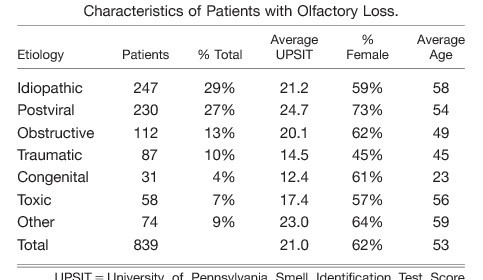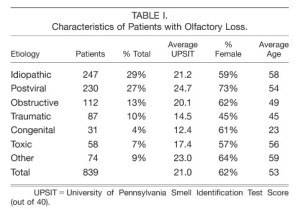
Study: Idiopathic Olfactory Loss and Cognitive Dysfunction
Anosmia is rarely a life threatening disorder, however, the loss of olfactory function is associated with serious risks and hazards.1 Individuals with impaired olfactory function may not be able to detect important warning odors such as those caused by gas leaks, volatile chemical fumes and fires, and can therefore place themselves at an increased risk for serious injury or death.1 Such individuals also suffer a severe detriment to their quality of life, one that is under appreciated by their family, friends, and even by their physicians.
Although anosmia can result from upper respiratory infections, head trauma, nasal or sinus disease, and other less common causes, the cause for many remains idiopathic, with up to 30% of cases displaying no known origin.2 Some studies have reported an association between neurodegenerative disorders and olfactory loss, noting that patients who go on to develop such disorders often have had evidence of an olfactory deficit. This raises the question as to whether an idiopathic olfactory loss might be a harbinger of further neurologic illness, such as Alzheimer’s disease. In addition, while for example patients who suffer a post viral olfactory loss can sometimes recover olfactory function, the prognosis regarding olfactory ability when the loss is idiopathic is unknown.
A recent study conducted by clinicians at the University of Cincinnati Medical Center explores the possible relationship between idiopathic olfactory loss and cognitive dysfunction, as well as attempting to determine the prognosis for recovery in such cases. The resulting article has been submitted to The International Forum of Rhinology and Allergy for review. Patients were administered an olfactory test and a separate cognitive test, along with obtaining an update on their overall medical history. The study concludes that olfactory loss in patients with idiopathic anosmia did not tend to improve over time; however there did not appear to be an increased risk of developing cognitive disease at least in these cases of idiopathic anosmia. Findings were first presented as a poster at the 2015 meeting of the American Rhinologic Society.
Graph: Origins of anosmia in 839 patients 2
In the words of Allen M. Seiden, MD, Professor, Department of Otolaryngology, “If patients present with an idiopathic olfactory loss, it is not likely to improve, but patients are also not necessarily at increased risk for developing Alzheimer’s disease or similar neurodegenerative illnesses.” In fact, magnetic resonance imaging (MRI) of the brain, while often performed in cases of anosmia, demonstrates a very low diagnostic yield, with a rate of abnormal findings similar to that seen in the normal population.2
The University of Cincinnati Medical Center is one of only five taste and smell centers in the country, and forms part of its comprehensive Otolaryngology Department. “Having seen patients with taste and smell problems for many years, it has become clear to me how devastating the loss of olfactory function can be in terms of day-to-day interactions with the environment,” says Seiden. Although effective treatment remains elusive, patients are sometimes found to have previously undetected inflammatory obstruction of the olfactory cleft that can be reversed. In addition, they receive useful information regarding prognosis, and tips to help compensate for their loss.
References: 1. Costanzo RM, Miwa T. Posttraumatic olfactory loss. Adv Otorhinolaryngol. 2006;63:99-107. 2. Hoekman PK, Houlton JJ, Seiden AM. The utility of magnetic resonance imaging in the diagnostic evaluation of idiopathic olfactory loss. Laryngoscope. 2014 Feb;124(2):365-8.
Allen M. Seiden, MD
Professor, Department of Otolaryngology
513-558-4154
Allen.seiden@uc.edu



